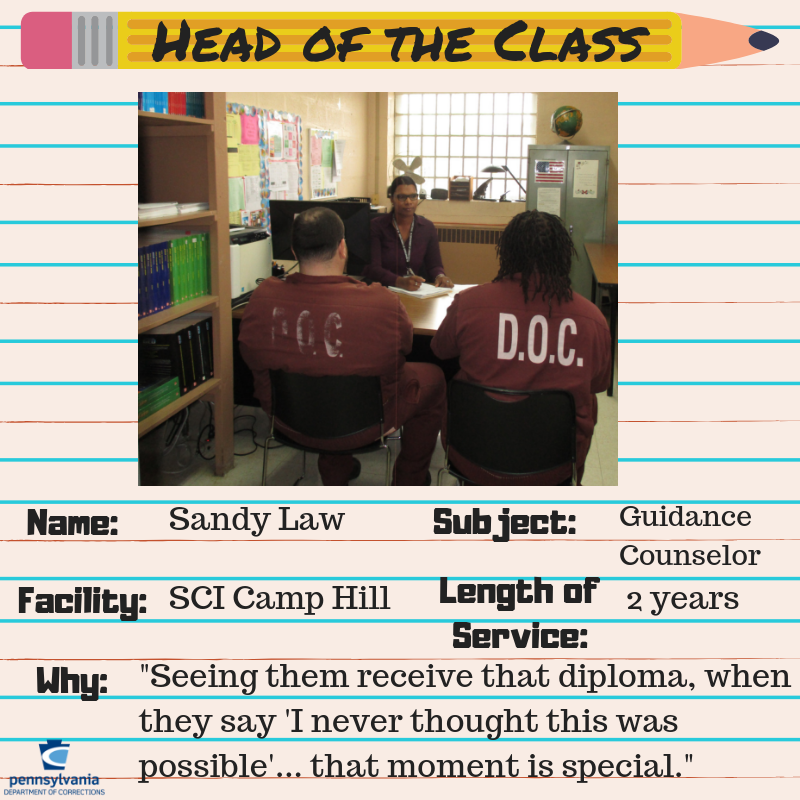The biggest difference between Sandy Law's previous students and present students is simply their age.
Both sets of students are emotional. Both have family issues. And both generally want to leave class early.
But at her previous school, students were teenagers. At her current school?
 "We can have 19, 20, 21, all the way to 62," Sandy said. "I have one who is older now."
"We can have 19, 20, 21, all the way to 62," Sandy said. "I have one who is older now."
Sandy is the general population guidance counselor at SCI Camp Hill, a position she's held for more than two years. Her previous experience was at a public high school, but she knew she wanted to work for the state in some capacity. She saw the posting for a guidance counselor in a prison, and she decided to go for it.
And she has no regrets.
"I love working in the prison," Sandy said. "I did 40 credits in criminal justice as an undergrad. I love the field but just didn't go in fresh out of college."
Her role as a counselor in a prison is the same as in a public school. Sandy helps the students figure out what classes to take and what credits they need to earn their degrees. SCI Camp Hill offers programs for inmates to earn diplomas and GEDs, as well as vocational programming (barber, HVAC, print shop and business.)
Class is consistent with public high school in terms of credits and hours. One credit equals 120 hours of class, and 16 credits are required to graduate.
"We do transcripts for them," Sandy said. "If I have someone who went to high school but dropped out in 9th or 10th grade, we work on their transcript and figure out what they need to take."
While her focus is education, Sandy also serves a role as an unofficial "psychological" counselor. Much like in public schools, her sessions may turn into traditional counseling as students deal with grief, bullying, emotional issues or other struggles. Sometimes she's even had to send students to the psychologist for immediate help.
Sandy credits her appreciation of education as to why she does what she does.
"An inmate said 'You have a master's degree. Why are you here?'" Sandy said. "I'm passionate about education, and I'm successful because I'm educated. If I can help my students achieve their academic goals, it will help them be successful when they parole."
Seeing her students earn their diplomas is another thing that reaffirms Sandy in what she's doing. To date she has had 23 students earn their GED and 69 earn their high school diploma—including recently a 62-year-old. Among the biggest challenges she faces is simply her students' pride and cultural differences.
"Men don't like it when you say, 'You failed in high school, let's do this together and fix it,'" Sandy said.
The other struggle is support. In a public school, counselors can reach out to family members for help. In prisons, they don't have that network to keep them on track.
But that's where Sandy comes in.
She reminds the students why they are doing what they do, and is encouraged by the stories of graduates who send their diplomas to their mom or wives or kids.
"When I meet with students for the first time, that moment when I go over with them and remind them 'You're not too old, let's figure this out together, don't give up.' That moment," Sandy said. "It's like a lightbulb moment when they realize 'Why not?'"